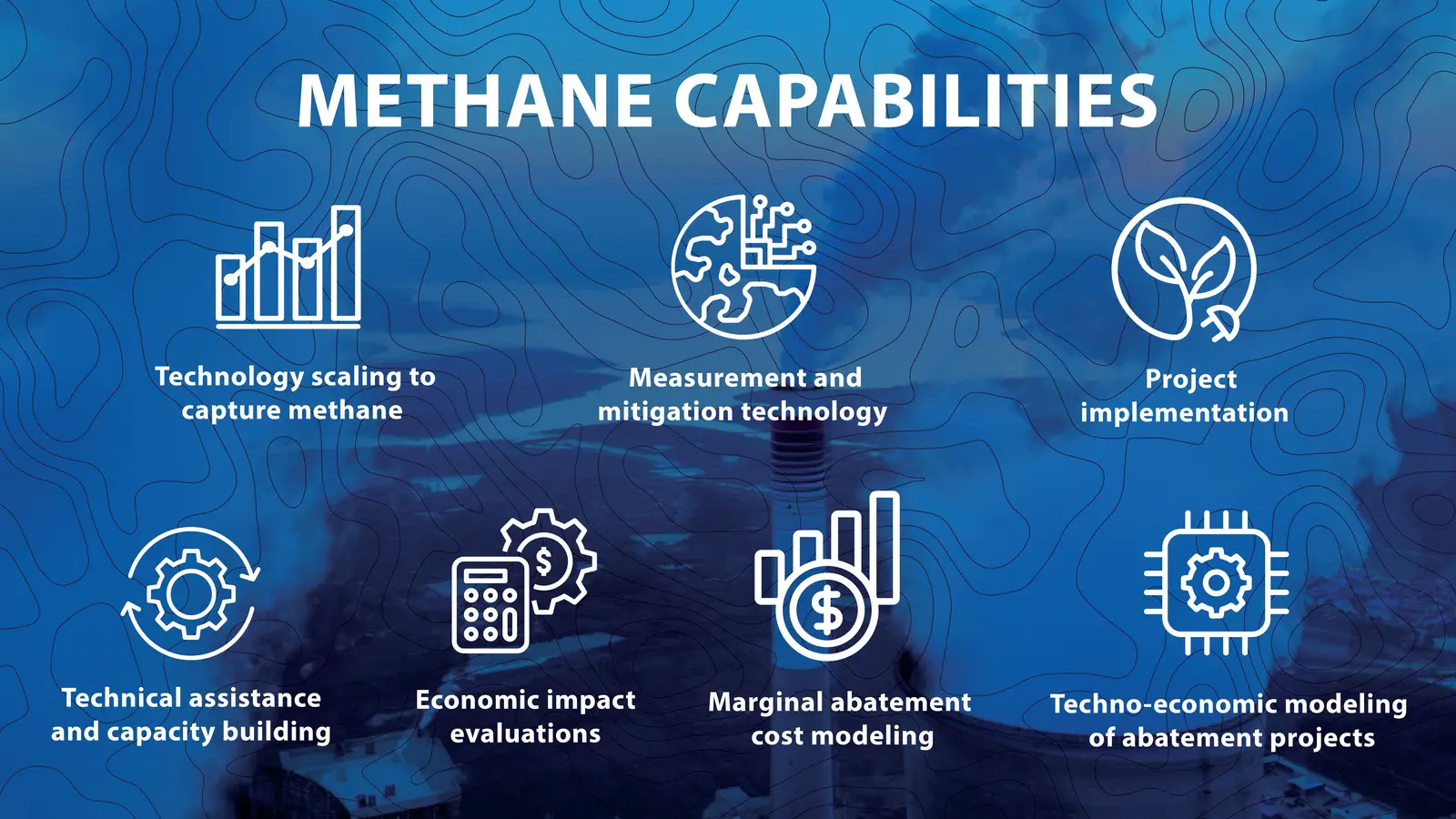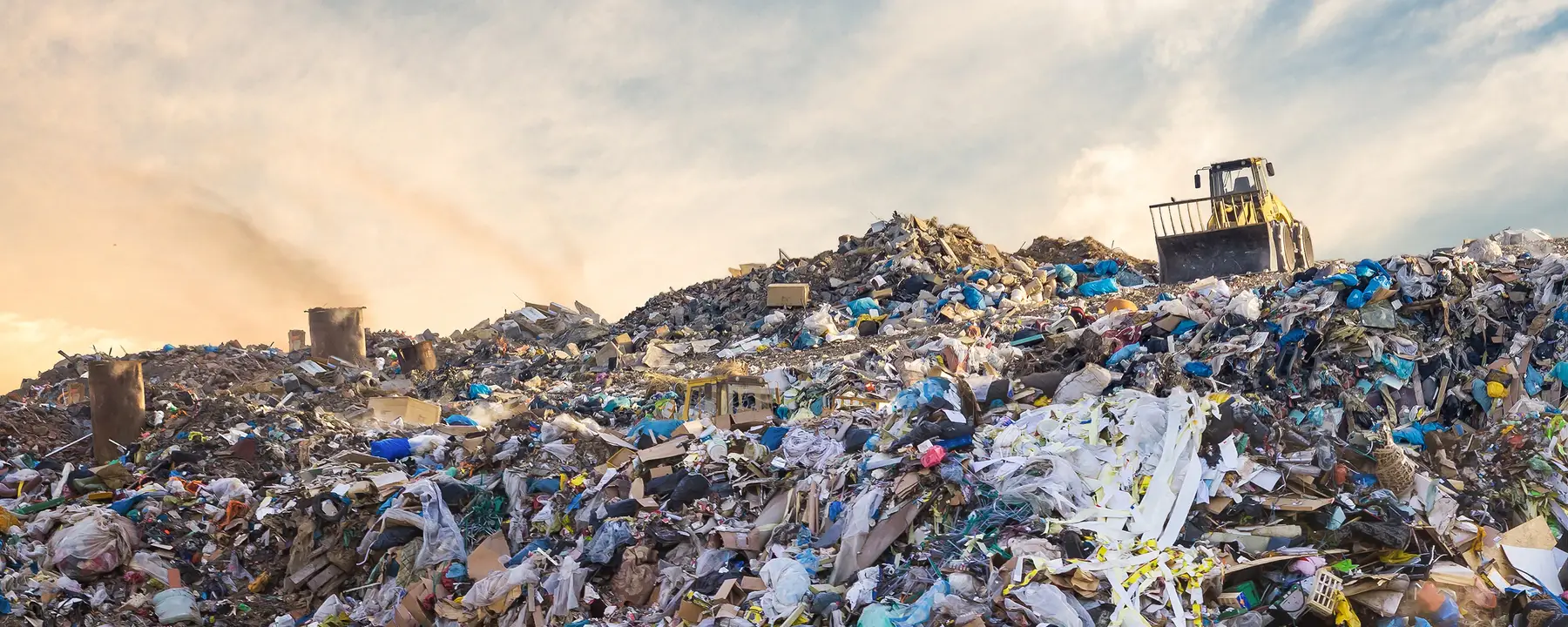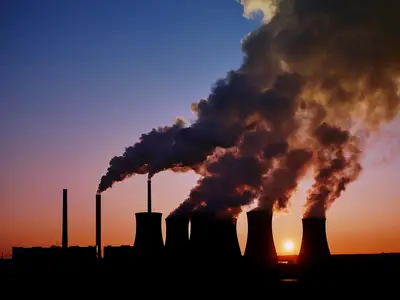Developing and leading innovative solutions to reduce greenhouse gas (GHG) emissions and limit warming to 1.5 degrees Celsius above pre-industrial levels.
Methane emissions are responsible for about 30% of global warming since pre-industrial times. This “super pollutant” is 80 times more potent than carbon dioxide over a 20-year period. It is emitted into the atmosphere from human and natural sources, like landfills, wastewater treatment, oil and gas operations, coal mines, and agricultural activities. To keep global warming below 1.5 degrees Celsius and to meet net-zero goals, we urgently need to reduce methane emissions.
There is good news. Because methane is a short-lived pollutant, reducing methane emissions today can have near immediate environmental benefits. In addition, reducing methane emissions will reduce ozone pollution, which will indirectly improve human health by reducing premature deaths and asthma-related emergency room visits and decreasing crop losses.
Methane Expertise
With more than two decades of experience, we support partners in
- developing techno-economic models to assess methane mitigation potential and costs for all major emitting sectors that have been applied at project, country, and regional levels;
- developing and scaling new abatement technologies; and
- leading international programs to measure and reduce methane emissions and help countries reduce their methane emissions to meet targets.
Clients include the U.S. Environmental Protection Agency (EPA), U.S. Department of Energy, the World Bank, the private sector, and more.

Measuring and Monitoring Methane Emissions
To reduce methane 30% by 2030, accurate and timely data and reporting are needed. Through EPA’s GHG programs, RTI collects national- and state-level emissions data across different industrial sources, like the solid waste sector. This information is used in EPA’s annual Inventory of U.S. GHG Emissions and Sinks, which provides aggregated GHG emission information across industries.
For solid waste management, we also supported the development of the United Nations Intergovernmental Panel on Climate Change’s methods for calculating methane emissions from landfill facilities. This work helps estimate methane emissions produced from the solid waste sector and develop projects for sector-level methane emissions. For example, our teams are working with developing country stakeholders to refine their methane emission inventories by moving to higher-tier emission accounting methods, which gives them more accurate and detailed data, making planning and action easier.
Informing and Prioritizing Methane Mitigation through Marginal Abatement Cost Curves (MACCs)
MACCs are used globally to analyze mitigation options and their associated costs and impacts, helping countries evaluate the cost of environmental solutions. MACCs are an internationally recognized source for country-specific data on methane emissions projects that are used by the U.S. Department of State in negotiations with other large emitting countries. RTI has supported EPA in developing global MACCs for the agriculture, waste management, energy, and industrial sectors for more than 20 years in almost 200 countries. RTI has also supported EPA in developing U.S. state-level MACCs for major sectors. These studies also include co-benefits of mitigation, such as measuring the benefit to air and water quality along with other non-GHG emission-related outcomes.
Using MACCs, we have also worked with clients in the United States to develop techno-economic models to estimate the supply potential and cost of capturing and upgrading biogas to renewable natural gas, which can be used as an energy resource in place of fossil natural gas while eliminating methane emissions.
Developing New Technologies to Capture and/or Use Methane
In North Carolina, RTI’s engineers and economists are partnering with Duke Energy, Duke University, and East Carolina University to understand the most effective ways to decarbonize the natural gas sector and to manage methane emissions from organic wastes in the state. We are developing an inventory of organic wastes, such as animal waste, landfills, and biosolids from wastewater treatment plants, and developing policy recommendations for the state to decarbonize the natural gas sector in a cost-effective way that aligns with the community’s needs.
In the oil and gas sector, methane from oil wells is typically low in volume, which makes it economically challenging to collect and process using conventional technologies. As a result, around 140 billion cubic meters of methane is flared worldwide annually, which introduces more than 300 million tons of carbon dioxide into the atmosphere. To address this challenge, RTI has developed a robust, low-cost technology to reuse and monetize methane from distributed sources, such as flared gas at wellpads and stranded biogas resources. By using a low-cost, mass-manufactured internal combustion engine-based technology, this novel solution can capture and convert methane into a variety of useful end products, such as methanol and diesel fuel. This solution can mitigate methane emissions, generate revenue, and reduce carbon intensity of the end products.
Global Efforts to Reduce Methane Emissions
RTI is finding ways to stop the production of methane around the world by targeting methane at the source. When organic waste and garbage are dumped into landfills, methane gas is created. The process, known as anaerobic decomposition, occurs as organic waste decomposes with a lack of oxygen. By developing and applying cost and environmental decision support tools, RTI is analyzing opportunities to manage gas that is created using gas collection and control systems (e.g., flares or energy recovery units) and biocover systems to enhance oxidation of methane. We also analyze opportunities for diverting organic waste from landfills by using compost or anaerobic digestion technologies. We evaluate the potential application for these methane-reduction options in international locations with wide-ranging socio-economic conditions, such as Argentina, Bosnia and Herzegovina, Guinea, Kazakhstan, Jordan, Nepal, Pakistan, Panama, Shanghai, United Arab Emirates, and Uruguay.











